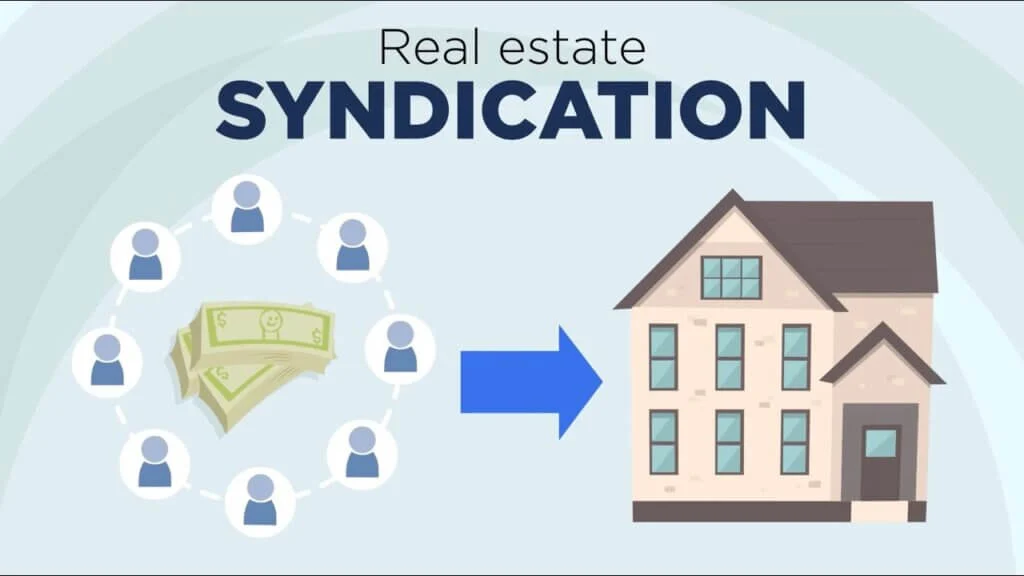Real estate syndication is reshaping how everyday investors participate in large-scale property deals. By pooling resources, individuals can gain access to high-value real estate that would otherwise be out of reach. This guide breaks down the structure, strategy, returns, and tax benefits of real estate syndication, especially for those just getting started.

Content
What is Real Estate Syndication?
Reals estate syndication is a collaborative investment model where a group of investors comes together to purchase and manage a property. The deal is typically led by a sponsor or syndicator, who finds the property, arranges financing, and handles management.
Investors—known as limited partners—contribute capital and receive a share of the income and profits, without handling day-to-day operations.
How Real Estate Syndication Works
Understanding how reals estate syndication works can help you make informed investment decisions. Here’s a simple breakdown:

- Deal Identification: The sponsor finds a promising real estate asset.
- Syndicate Formation: Legal structures like LLCs are created to manage ownership and responsibilities.
- Capital Raising: The sponsor raises funds from passive investors.
- Acquisition & Management: After purchase, the sponsor oversees operations, renovations, or improvements.
- Distributions & Exit: Investors receive profits during ownership and a final payout after a sale.
This process allows for passive income real estate opportunities with professional oversight.
Real Estate Syndication Structure
A proper real estate syndication structure ensures all parties know their roles and rights. Here’s how it’s typically set up:

- General Partner (GP): The sponsor. Manages the deal.
- Limited Partners (LPs): Investors. Contribute capital and earn returns.
- Legal Entity: An LLC or LP is created to formalize the agreement.
Often, preferred returns (usually 6–8%) are paid to LPs before profit sharing. After that, profits are split—commonly 70/30 or 80/20 (LP/GP). This structure aligns incentives and protects investors’ interests.
Real Estate Syndication for Beginners
If you’re new to this, real estate for beginners can be approachable with the right guidance. Here’s what you should know:
- Minimum investments typically range from $25,000 to $100,000.
- You don’t need to be a landlord or deal with tenants.
- Sponsors handle everything—from repairs to tenant management.
This makes syndication ideal for those seeking truly passive income while still gaining access to institutional-grade assets.
Reals Estate Syndication vs REIT
When evaluating reals estate syndication vs REIT, it’s important to understand how they differ:
| Feature | Real Estate Syndication | REIT (Real Estate Investment Trust) |
|---|---|---|
| Ownership | Direct ownership stake | Shares in a trust or company |
| Control | More control via sponsor | No control over decisions |
| Returns | Higher potential returns | Lower, but more liquid |
| Tax Benefits | Depreciation passed through | Limited tax sheltering |
| Liquidity | Illiquid (3–7 years) | Highly liquid (public REITs) |

If you’re aiming for higher returns and better tax treatment, syndication may be the better choice—though REITs offer liquidity and ease of entry.
Real Estate Syndication Returns
Typical reals estate syndication returns combine steady cash flow with long-term appreciation. Common benchmarks include:
- Preferred Return: 6–8% annually before splits.
- IRR (Internal Rate of Return): 12–18% projected.
- Equity Multiple: 1.8x–2.2x over the life of the investment.
These numbers depend on the asset class, location, and management strategy. A solid sponsor will provide detailed financial projections and explain risk factors up front.
Real Estate Syndication Investment Strategy
A successful reals estate syndication investment strategy focuses on value creation. Most deals target value-add opportunities like:
- Renovating older multifamily buildings to increase rent.
- Repositioning outdated commercial assets.
- Improving operations in underperforming assets.
The goal is to boost net operating income, thereby increasing the property’s value and investor returns. Clear communication and reporting from the sponsor are key indicators of a trustworthy strategy.
Real Estate Syndication Example
Let’s say a sponsor identifies a 120-unit apartment building for $12 million. They raise $4 million from investors and finance the remaining $8 million. Renovations and improved management raise the rent, increasing the building’s value to $16 million after 5 years.
Investors receive:
- Quarterly income from rent (6–8% preferred return).
- A lump sum from the property’s sale.
- Overall return of 16–18% annually.
This reals estate syndication example highlights how investors can benefit from both income and capital appreciation—without doing the heavy lifting.
Real Estate Syndication Tax Benefits
The reals estate syndication tax benefits are one of its biggest perks. Investors may enjoy:
- Depreciation Deductions: Helps offset rental income on paper.
- Cost Segregation: Accelerates depreciation for greater upfront deductions.
- Pass-Through Losses: Reported on a Schedule K-1.
- Capital Gains Treatment: Profits from sales are taxed at favorable long-term rates.
Together, these benefits make real estate a tax-efficient vehicle for building wealth.
Reals Estate Syndication Due Diligence
Before investing, conducting reals estate syndication due diligence is critical. Here’s how to protect yourself:
- Vet the Sponsor: Check past deals, investor reviews, and background.
- Review the PPM: The Private Placement Memorandum outlines terms and risks.
- Understand the Market: Analyze the location, demand, and competition.
- Know the Exit Plan: Confirm how and when the property will be sold or refinanced.
Asking the right questions upfront ensures you’re backing a trustworthy deal.
Conclusion
Reals estate syndication provides a gateway to high-quality property investments, enabling passive investors to access real estate assets without the operational burden. Whether you’re just starting out or diversifying an existing portfolio, syndications offer the chance to build long-term passive income, benefit from attractive tax advantages, and share in institutional-grade returns.
By understanding the structure, performing due diligence, and partnering with experienced sponsors, you can unlock a powerful wealth-building strategy—without becoming a landlord.
Real Estate Syndication is a powerful investment strategy that allows multiple investors to pool their resources and collectively invest in larger, income-generating properties. This approach not only minimizes individual risk but also provides access to high-value assets that might otherwise be unattainable. If you’re looking to expand your reach and connect with serious investors, you can Advertise With Us to showcase opportunities in real estate syndication and grow your network effectively.
FAQs
Is real estate syndication a good investment for beginners?
Yes, real estate is ideal for beginners seeking passive income, professional management, and access to large-scale property investments.
How do investors make money in real estate syndication?
Investors earn through preferred returns, profit splits upon sale, and tax benefits such as depreciation and capital gains treatment.

With a passion for matching clients with their dream homes, Mary’s experience and knowledge of the real estate market make her a trusted advisor. She’s your go-to expert for buying or selling properties in the heart of the city.












